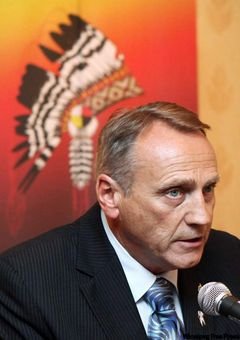How Indians might actually get to pick the next Indian Affairs minister

With a spring federal election a distinct possibility as the reigning minority Conservative government faces defeat by the opposition, there’s no time like the present to start prognosticating about MPs’ prospects for re-election.
I am particularly interested in those races where the Aboriginal vote could play a key role by virtue of their numbers. And few would be more interesting or potentially consequential than the contest that would unfold in the BC riding of Vancouver Island North.
That’s because Vancouver Island North is represented by none other than current Indian and Northern Affairs Minister John ‘No Race-based Fishery’ Duncan. And last time around, the Honourable member and rookie Cabinet minister just barely eked out a victory for his party over his closest rival, as seen by these CBC election results from 2008:
| PARTY | Candidate | # of Votes | % of Total Votes Cast |
|---|---|---|---|
| Conservative | John Duncan | 26,166 | 45.78 |
| New Democrat | Catherine Bell | 23,681 | 41.43 |
| Green | Philip Stone | 4,563 | 7.98 |
| Liberal | Geoff Fleischer | 2,391 | 4.18 |
| Independent | Jason Draper | 361 | 0.63 |
As you can see, a total of 57,162 votes were cast in the last election in Duncan’s riding, a race he won by just 2,485 votes, or apx. four per cent more than the second-place NDP candidate. Here’s the thing: Aboriginal people make up 9% of that riding, or up to double the margin of victory.
In 2008, there were 88,077 electors on Elections Canada’s list for the district. According to a Nov. 2010 piece in the Georgia Straight,
In Duncan’s riding of Vancouver Island North, which the Conservatives won by less than 2,500 votes in 2008, there were 10,065 residents of aboriginal descent. This is according to a page compiled by Statistics Canada.
Even if we assume half of that total Aboriginal population in this riding is of voting age, that’s still 5,033 people — more than enough to cancel out the 2,485 votes it took to get Duncan into office, should they vote as a bloc.
In other words, it could be Indians who hold the fate of the Indian Affairs minister in their hands.
And before anyone else says it, I am well aware that my headline is technically misleading, in that Indians may not actually get to ‘pick’ the next Indian Affairs minister, but, should they decide to collectively exercise their electoral muscle (not to be confused with pectoral muscle), they sure as hell will get to veto the current one. Call it the first shot fired across the bow by the brown baby boom. (I also acknowledge I am substituting ‘Indians’ for all Aboriginal people in the riding, essentially for poetic license. A more exact number-crunching needs to be done.)
Now, of course, I’d be the last person to assume that every Indian opposes the Conservative party: indeed, some are proudly card-carrying members. All I’m concerned with here is what I find to be something of a delicious irony: that, for once, Indians will get the chance to say ‘yay’ or ‘nay’ to whoever lords over them as minister of their ‘Affairs.’ True, it’d be a symbolic (and, some might say, mostly-hollow) victory, but if nothing else, it could send a message as to what we think of what’s being done on our collective behalf. And if it starts to awaken us to our voting power if and when we do act as a bloc, that might not be such a bad thing either.
And so, enemies of the current office-holder of the Indian Affairs department, you now have the means of initiating a “Dump Duncan” campaign.
Friends of Duncan, you should now be aware of what you could be up against should you wish to protect your recently installed Captain of the Indian Industry. Proceed accordingly.


Hey, thanks for crunching these numbers. Since my family pretty much makes up that 9% of the north island population (my grandma did have 14 kids, and most of our extended family lives in that riding), I’ll be sure to pass your piece along. I like the idea of having a veto. If nothing else, we can say “thanks, but no thanks” to Duncan.
Twenty-six (26) other constituencies share the same possibilities – where Native people have the swing vote should they come together in a block vote. But ahhhh, why give the pleasure to only one group of Indians on an Island.
What are, and where can I find out more about, these other 26 ridings, sir?